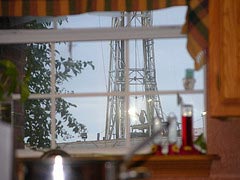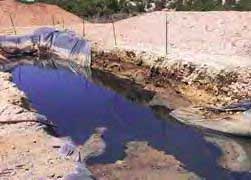Earthworks' Oil & Gas Accountability Project works with tribal, urban and rural communities to protect their homes and the environment from the devastating impacts of oil and gas development.
See: Patrick Reis. NYT. Oct. 6, 2010. "W.Va. Sues Obama, EPA Over Mining Coal Regulations."
See also:
Wiseman, Hannah J. “Untested Waters: The Rise of Hydraulic Fracturing in Oil and Gas Production and the Need to Revisit Regulation.” Fordham Environmental Law Review 20 (2009): 115-170.
Horwitt, Dusty. "Drilling Around the Law: Drinking Water Threatened by Toxic Natural Gas and Oil Drilling Chemicals". Environmental Working Group, 2009.
"I will start this story by saying that Aruba Petroleum has taken a great deal from my family, but they cannot take away our faith in God. This story may sound like one of defeat, but we are not defeated.
My husband Tim, daughter Reilly, and I purchased 10 acres and a wonderful home in Wise County, TX about six years ago. We thought that country life would be the best life for our daughter given her love of animals and nature. We have lived a peaceful life, improving our home when we could and striving to provide the best childhood possible for Reilly.
Aruba Petroleum turned that life upside down on August 29th 2009 with no regard for property or human health. We learned shortly after that day that our 10 acres were, unfortunately, a part of the 920 acre Wright lease held by Aruba Petroleum."

- Threats to water quality
- Inadequate regulation of hydraulic fracturing (including the Halliburton loophole)
- Hydraulic fracturing 101
- More facts, news, other information
Hydraulic fracturing is a common technique used to stimulate the production of oil and natural gas. Typically, fluids are injected underground at high pressures, the formations fracture, and the oil or gas flows more freely out of the formation. Some of the injected fluids remain trapped underground.
A number of these fluids, such as diesel fuel, qualify as hazardous materials and carcinogens, and are toxic enough to contaminate groundwater resources. Read more details in the Oil and Gas Accontability Project's (OGAP) basic primer on hydraulic fracturing.
Washington, D.C. based environmental advocacy group. Website includes link to video, Fracking and the Environment: Natural Gas Drilling, Hydraulic Fracturing and Water Contamination, from Democracy Now! It includes an interview with ProPublica's Abrahm Lustgarten. 9/3/09.
WASHINGTON, D.C., April 1st, 2010 -- In addition to opening up vast areas of our coastline to offshore oil drilling, the Obama administration yesterday elected to defend a Bush-era policy that allows unlimited amounts of our nation's treasured public lands to be used as toxic waste dumps for the multinational hardrock mining industry.
This decision -- in the form of a response to federal litigation filed by a coalition of conservation and Native American groups -- is completely inconsistent with earlier remarks by Interior Secretary Ken Salazar on the importance of updating our federal mineral policies to protect public lands.
"Increased oil and gas drilling off our coasts, and now unlimited toxic waste dumping on our public lands send the message that profits are more important than water, wildlife and communities," said Lauren Pagel, Policy Director for EARTHWORKS, one of the plaintiffs in the case against the regulations. She continued, "With this move the Obama administration, like the Bush administration before it, is abandoning clean water and communities in favor of gifts to extractive industries."
"The administration has claimed support for reforming one of the most outdated laws on the books -- the 1872 Mining Law -- yet they choose to perpetuate the gross giveaways to an already subsidized industry without regard for other valuable uses of the public's land," said Pagel.
She continued, "It's time for the Obama administration to walk their talk when it comes to our shorelines and our public lands, and responsibly balance resource extraction with protections for communities and taxpayers," said Pagel.
Fracking will require the storage of frack wastewater in pits.
There are many fluids and wastes associated with oil and gas operations that can poison living organisms. This web page contains information on some of the following issues of concern related to the storage and disposal of oil and gas wastes:
- How pit pollution occurs
- Soil and water contamination from pits
- Wildlife and livestock mortality related to pits
- Toxic materials stored and disposed of in pits







